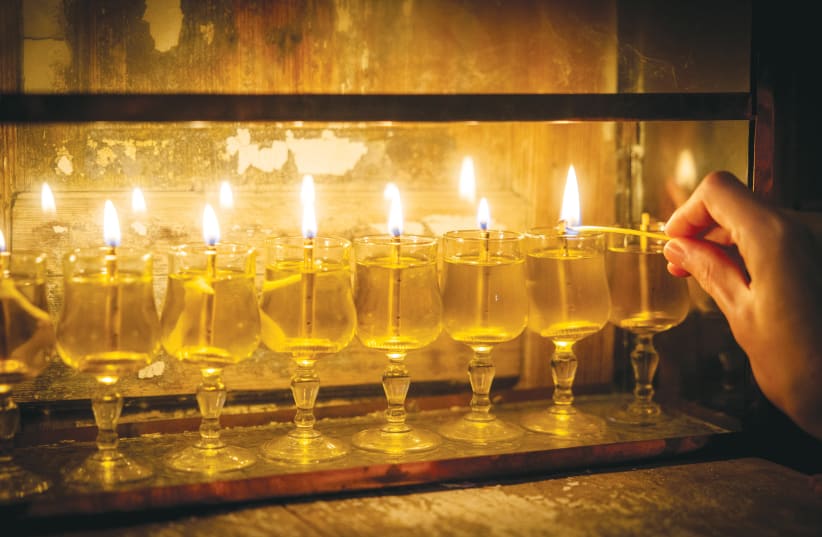ARTICLE AD BOX
The story of Hanukkah serves as a cautionary tale for Syria, as the story teaches us that winning isn't enough; sustaining it requires unity, justice, and integrity.
By ELI FEDERMAN DECEMBER 19, 2024 03:48 A HANUKKIAH is lit on the eighth night of Hanukkah, last year. The flickering flames serve as a poignant reminder of resilience and faith, says the writer.
(photo credit: YONATAN SINDEL/FLASH90)
A HANUKKIAH is lit on the eighth night of Hanukkah, last year. The flickering flames serve as a poignant reminder of resilience and faith, says the writer.
(photo credit: YONATAN SINDEL/FLASH90)
Hanukkah, celebrated next week, tells the story of the Maccabees – fighters who stood against tyranny, reclaimed their freedom, and rededicated the Temple and menorah in Jerusalem. It reminds us of the resilience of the human spirit. This year, Syria offers a striking parallel with the ousting of president Bashar al-Assad, a dictator who ruled through fear and brutality.
The Seleucid Empire, which the Maccabees fought in the 2nd century BCE, was Syrian-Greek, with its capital in what is now modern Syria. Then, as now, the region was a battleground for oppression and freedom. For decades, Assad crushed dissent, committed atrocities, and fueled a civil war. His removal feels like a moment of light breaking through darkness, much like the Maccabees’s victory over their oppressors.
But Hanukkah is more than a story of triumph; it’s also a warning. The Hasmonean dynasty, descended from the Maccabees, lost its way after its victory. Corruption, division, and power struggles led to its downfall. Syria now faces the same risks.
Hayat Tahrir al-Sham, the rebel group that helped end Assad’s rule, is an extremist religious organization designated a terrorist group only a few years ago. Removing Assad is only the first step. What comes next will determine whether this light endures, or fades into darkness.
The Hanukkah story begins with oppression. The Seleucid Empire desecrated the Jewish Temple and banned Jewish practices, trying to force assimilation into Greek culture. Though vastly outnumbered, the Maccabees fought back, cleansed the Temple, and relit the menorah.
Syria’s story echoes this arc. For decades, Assad’s regime destroyed communities and silenced dissent. Yet Syrians resisted through protests, grassroots movements, and armed opposition. Assad’s removal marks a moment of hope and an opportunity to reclaim their nation.
But as Hanukkah reminds us, victory can be fleeting. The Maccabees’s triumph over the Seleucids was historic, but their successors failed to uphold their ideals. They became expansionist, forced conversions, and engaged in power struggles, weakening their kingdom and inviting Roman domination.
Winning freedom must be sustained by unity, justice, and integrity
Their story teaches us that winning freedom isn’t enough; sustaining it requires unity, justice, and integrity. Without these values, even the greatest victories can unravel.
Syria now stands at a similar crossroads. Its future depends on avoiding the same pitfalls as the Hasmoneans. The opposition is deeply fractured, with competing visions for Syria’s future. Infighting risks derailing progress, much like the Hasmoneans’ internal struggles.
Revolutionary leaders often repeat the mistakes of their predecessors, consolidating power instead of building inclusive institutions. Syria’s strategic location also makes it vulnerable to foreign interference. Just as Rome exploited the Hasmoneans’ divisions, foreign powers could manipulate Syria’s instability for their own gain.
Stay updated with the latest news!
Subscribe to The Jerusalem Post Newsletter
Hanukkah is not just a story of war; it is a story of renewal. After their victory, the Maccabees rededicated the Temple and rekindled the menorah, a symbol of hope and perseverance. Syria’s leaders have the same opportunity.
Rebuilding Syria will take more than removing Assad. It will require addressing the trauma of war, creating inclusive institutions, and prioritizing the needs of the people over personal ambition. Leaders must foster unity, accountability, and reconciliation.
The Hasmoneans fell because they abandoned the values that fueled their revolution. Syria’s leaders must stay true to the ideals of freedom, justice, and dignity that inspired their people to fight.
As we light the hanukkiah this Hanukkah, we celebrate the triumph of light over darkness and resilience over oppression. Assad’s ouster mirrors this spirit of defiance and hope. But Hanukkah also warns us that victory is fragile. Liberation can quickly turn into tyranny if leaders lose their way.
Lighting a flame is not the end of the story – it’s the beginning. Syria’s leaders must choose unity over division, justice over revenge, and the people over personal power. The light of freedom must be carefully tended. For Syria, the real work begins now.
The writer has written on religion, law, and the Middle East for The Wall Street Journal, New York Times, LA Times, Reuters, CNN, Fox News, and others. Follow him on X: @elifederman.

 1 week ago
28
1 week ago
28








 English (US) ·
English (US) ·